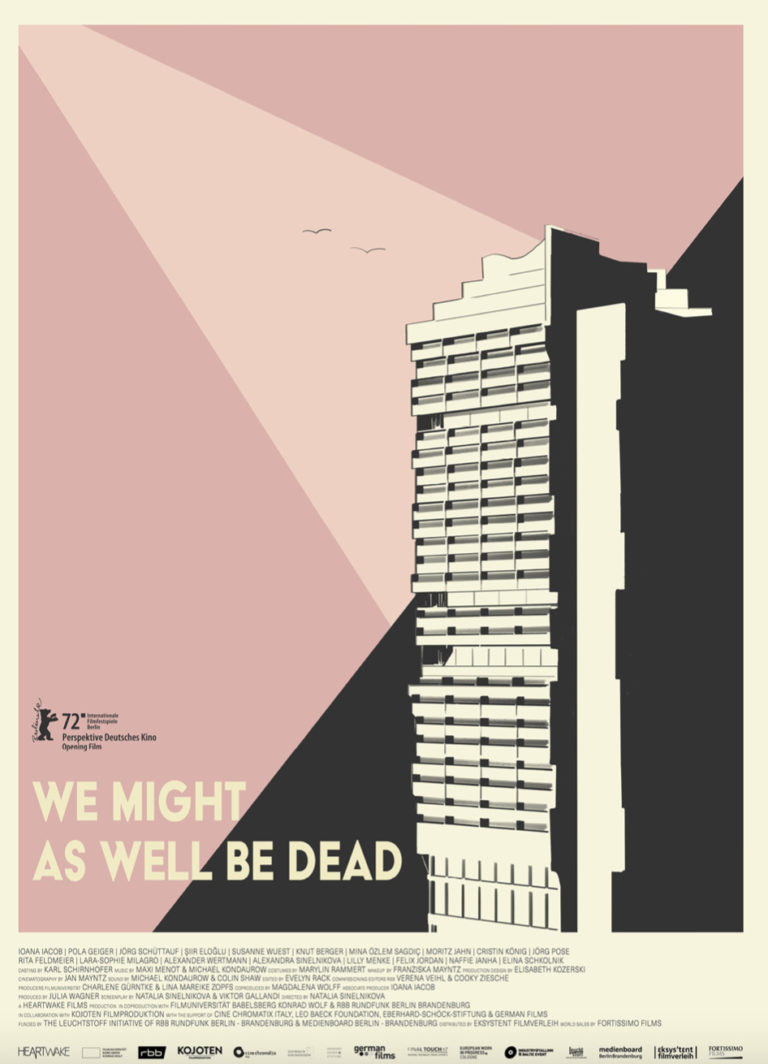
We Might As Well Be Dead is the epitome of fear as a self-reproducing system that dominates the political discourse. This is the feature debut directed by Russian-German Natalia Sinelnikova, that was presented at the 72nd Berlin Film Festival and at the 21st Tribeca Film Festival.
Forty year old Anna Wilczynska (Ioana Iacob) lives with her sixteen year old daughter Iris (Pola Geiger) in the appealing apartment block of St.
Phoebus, that is located near the forest. This high-rise building nestled in nature is famous for its carefully curated community, where many new residents aspire to be accepted.

Anna holds the important position of security officer, and she questions each new visitor at the entrance with a standard question: “Have you noticed any noticeable physical or mental changes in the last two weeks? Have you ever been excluded from a community because of antisocial, immoral or rash activities?”
The woman has to deal with increasing pressure, the day the dog of one of the residents disappears and her daughter locks herself in the bathroom in the belief that her evil eye is responsible for this circumstance….and many others that follow. To prove her daughter’s concerns irrational, Anna starts looking for the missing pet. But apprehension and mistrust spreads amongst the members of the community. Neighbours begin to suspect each other. Anna tries to call the inhabitants to reason, yet a group of voluntary vigilantes opens investigations against her, also because of her ethnic origins.
Sinelnikova’s social allegory of a chauvinist society is noble in its intent, but not as effective in its realisation. We Might As Well Be Dead is not exactly a black comedy, it’s just dark, there is no humour that usually distinguishes this film genre. Somehow it evokes the morbid tones that subtend to a social critique used by Yorgos Lanthimos, in the way it utilises dystopian settings to mirror reality’s stilted humanity. In this way, Sinelnikova presents a rich tapestry of characters, each one succumbing to the role the Orwellian structure has imposed upon them. From the caretaker Gerti Posner (Jörg Schüttauf), to the sports coach and counsellor Zeynep (Mina Ozlem Sagdic), as well as the poet who sells his verse in the lift and sleeps in the boiler room, Wolfram (Moritz Jahn) — just to mention a few.

The structure of this wider society is effectively constructed through distortions and abysmal tragedy, but the weakness of the film is how the story passively plods along. It is all rather static and repetitive. The only thrilling element is the leitmotiv of the Carol of the Bells music. This famous Christmas carol — based on a very old composition by the Ukrainian composer Mykola Leontovych — eerily comes up in various occasions to instil a sense of despondency and malaise.
Despite the lack of emotional and narrative crescendo, it is remarkable that Natalia Sinelnikova’s film originates from her thesis at Konrad Wolf Film University of Babelsberg. The high-rise microcosm comes across as very familiar to this young director, who was actually born in a housing estate on the outskirts of St. Petersburg, similar to the fictional one she designed. As a Russian Jew who immigrated with her family to Germany, the xenophobic treatment she received as a refugee in the nineties fully transpires in We Might As Well Be Dead. As Sinelnikova explains: “no matter how hard I tried to adapt to the new rules and rituals to become German with all my heart and soul — the feeling of being a stranger persisted.”
Technically, the filmmaker favours a fixed camera. The image is often cropped and the controlled aesthetics of every angle of the St. Phoebus building seem like a snapshot from Architectural Digest. Visually we have the sensation of observing an aquarium where specimens of an unhinged species carry on with their lives, under our scrutiny. Thus, Sinelnikova resorts to absurdism to account the ongoing existential crises in our society that professes inclusion but is still stuck in bleak sectarianism.
All images are Courtesy of Heartwake Films
Final Grade: B

